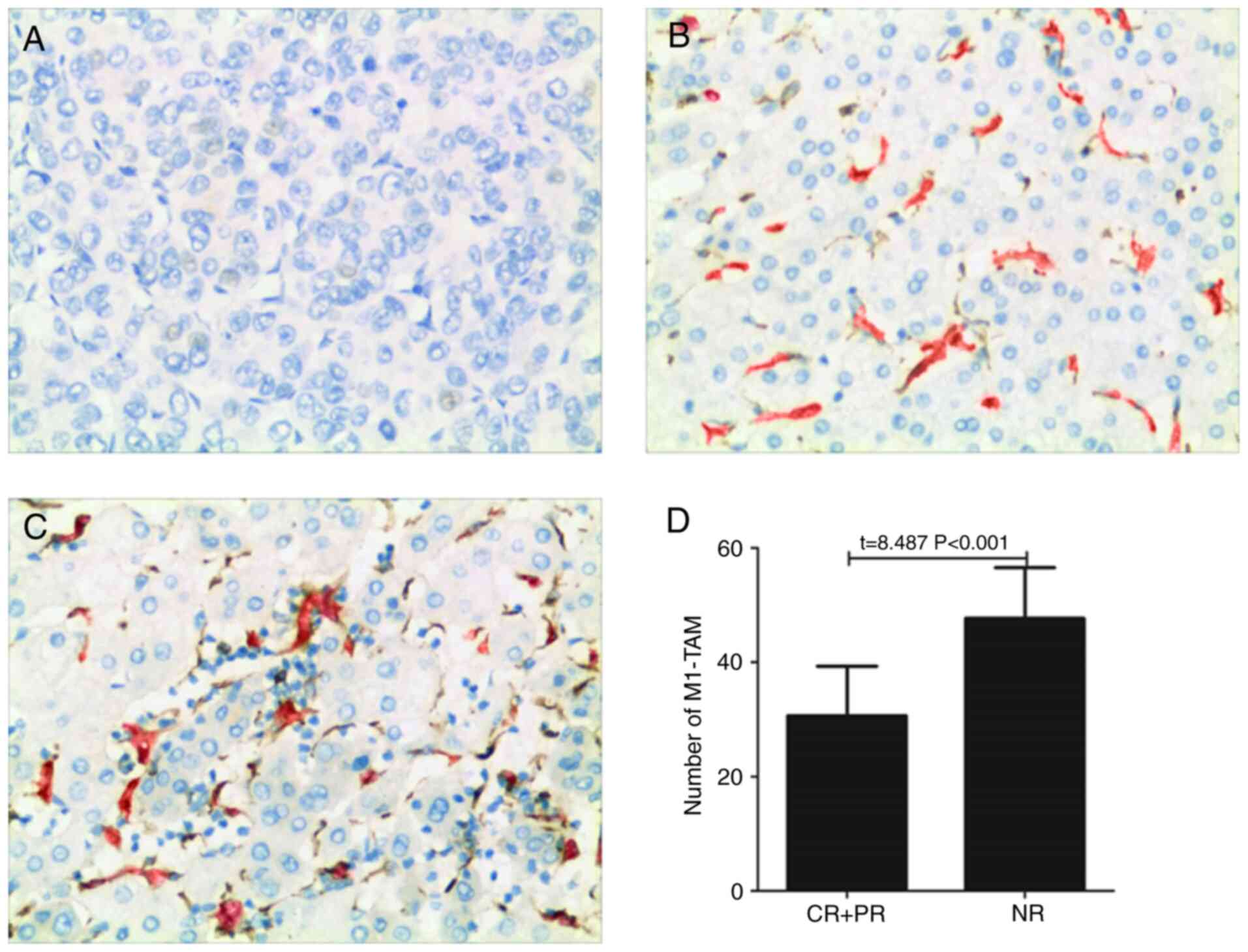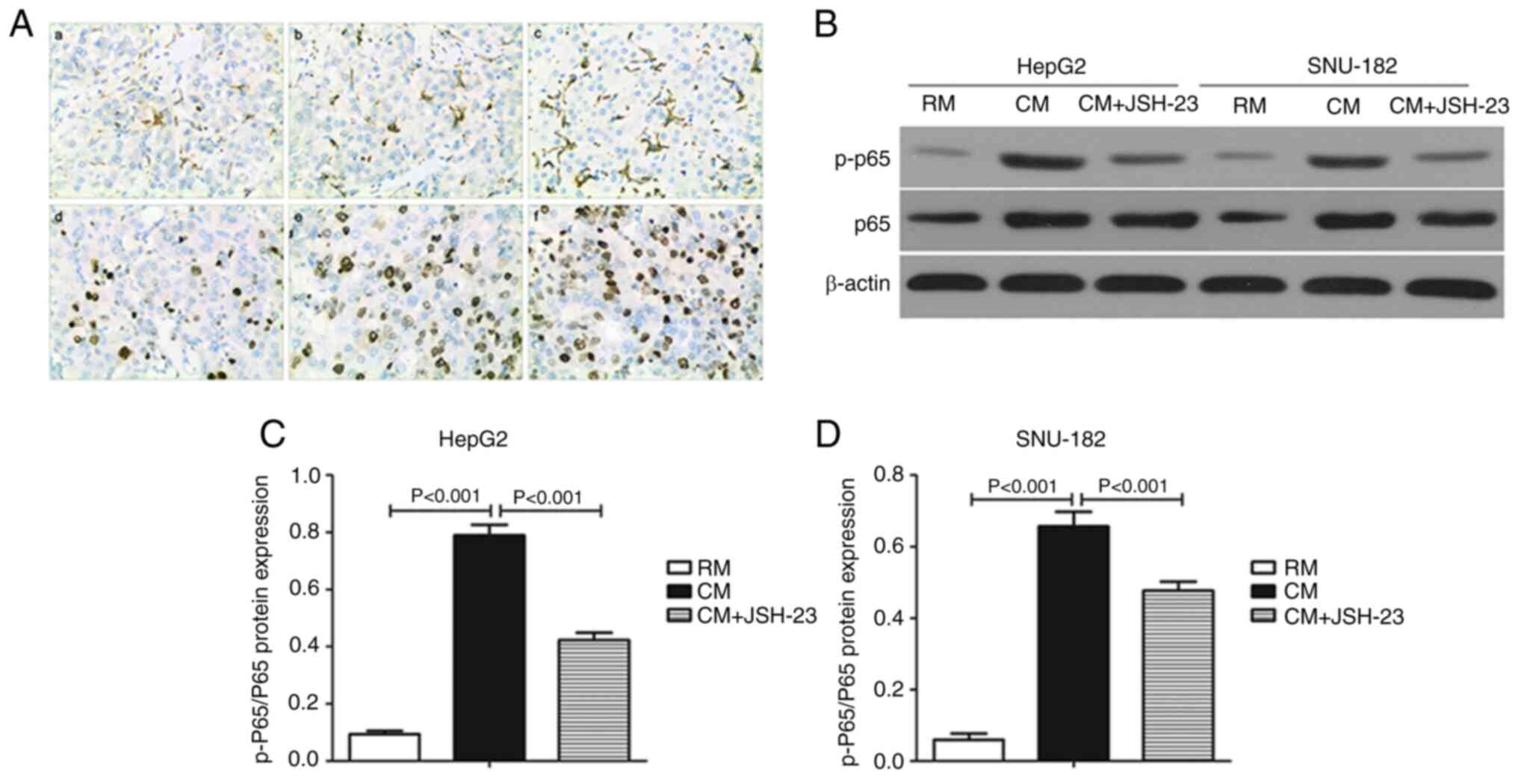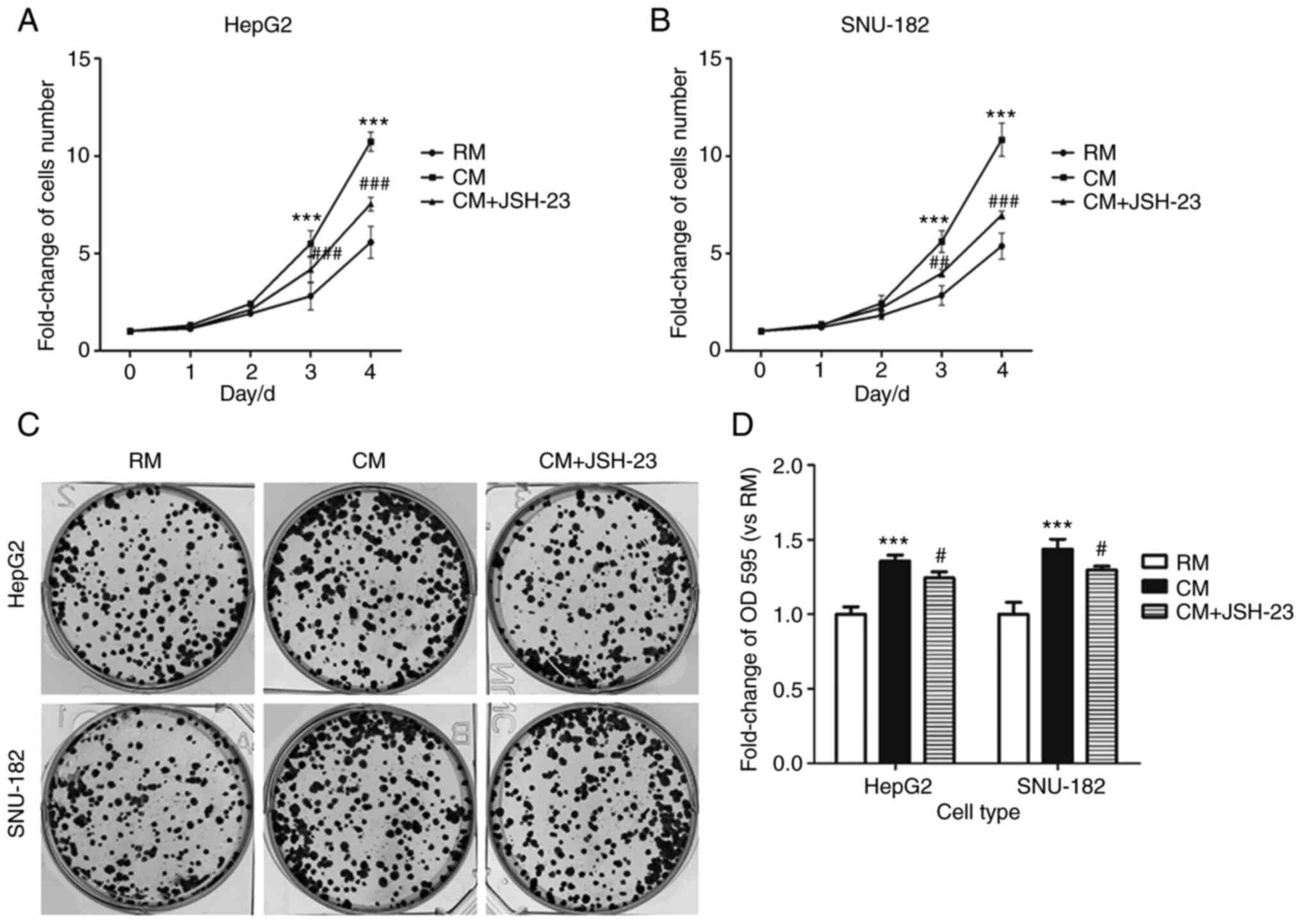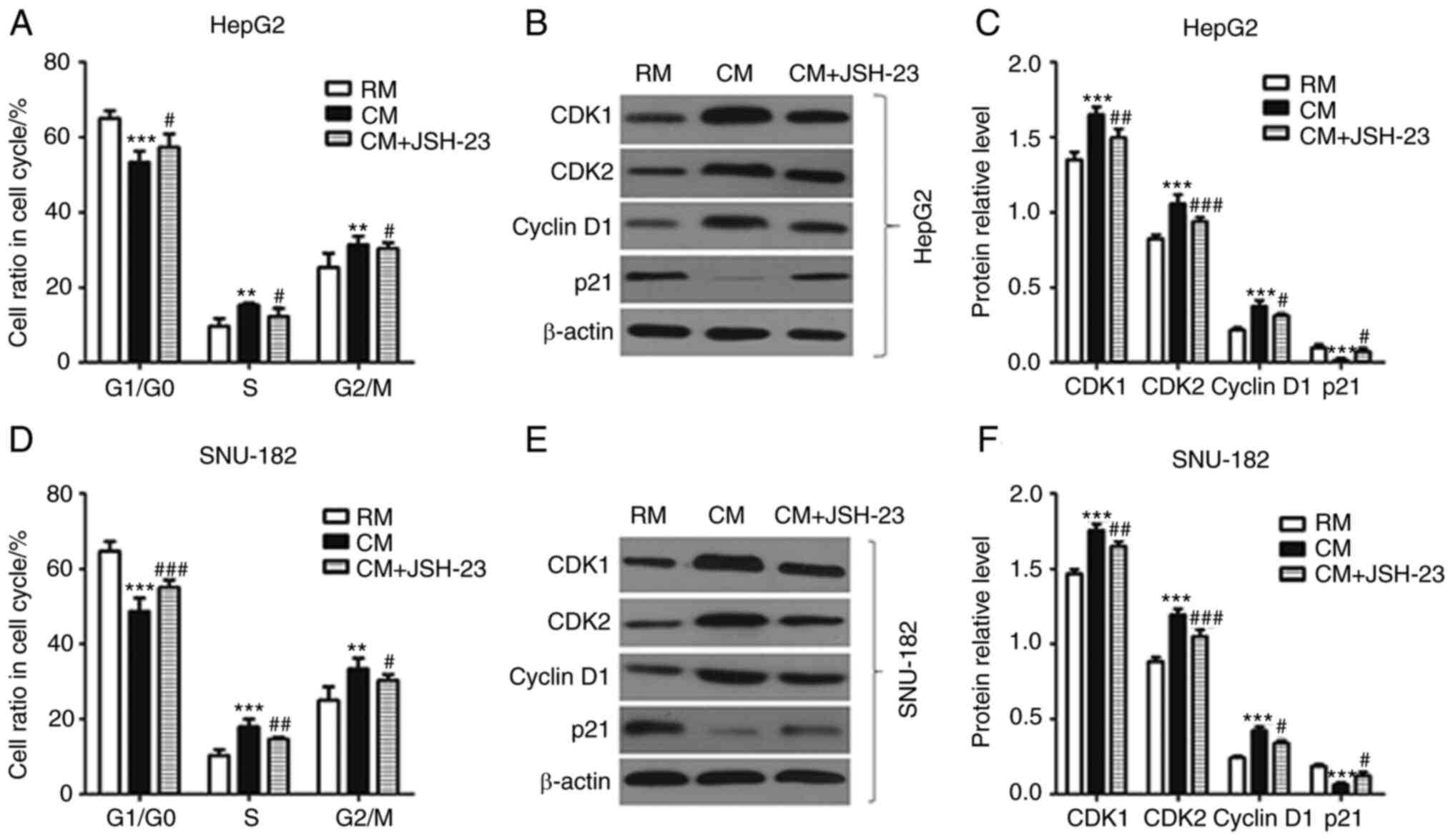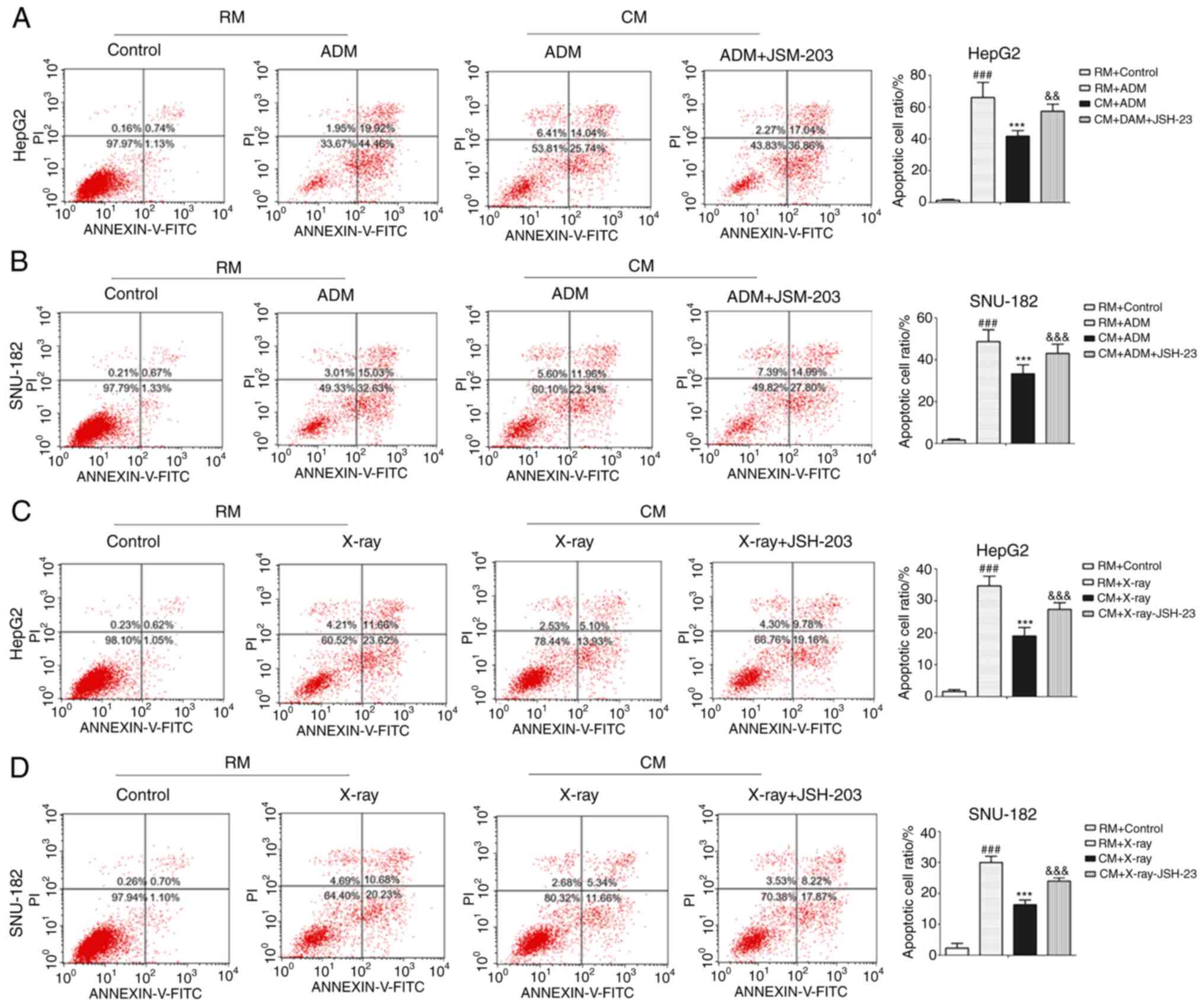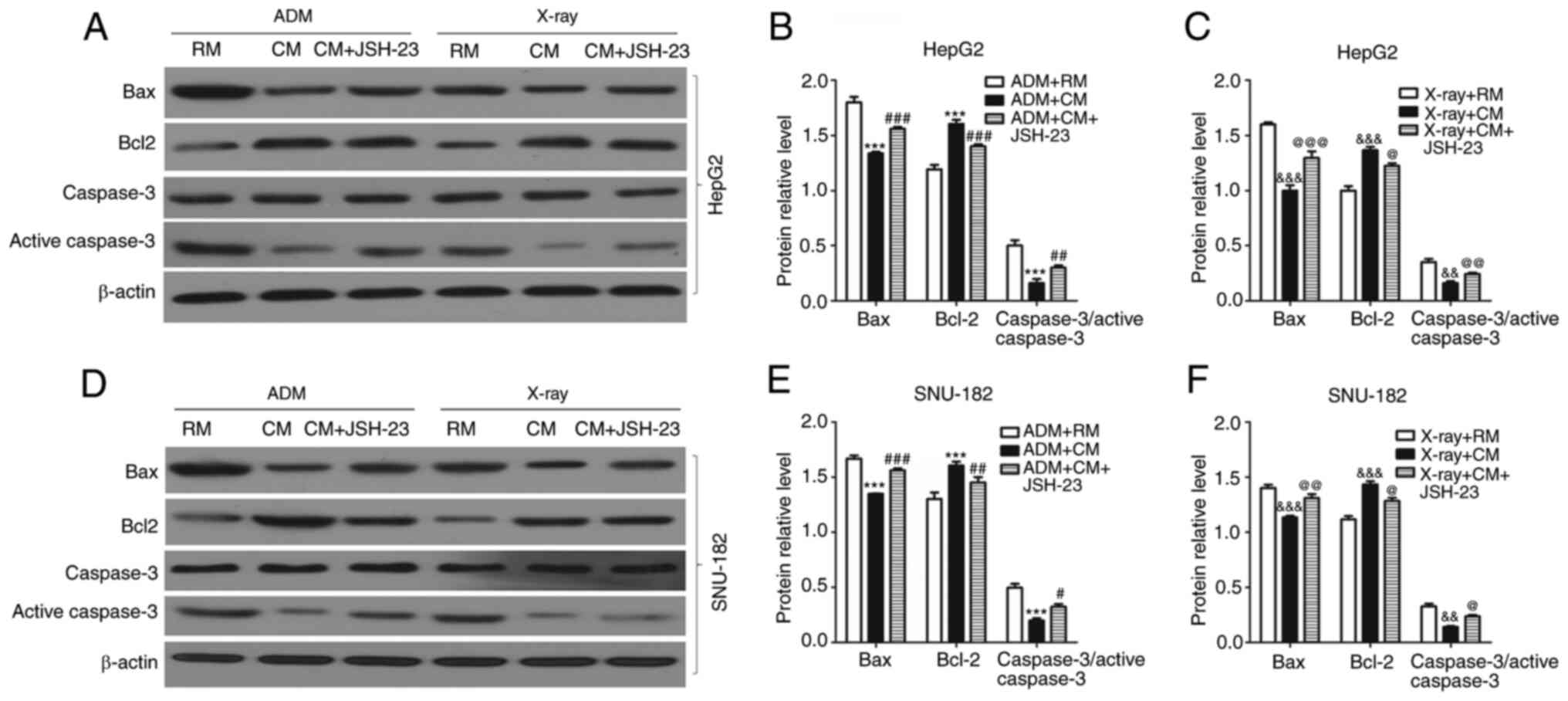|
1
|
Chen JG and Zhang SW: Liver cancer
epidemic in China: Past, present and future. Semin Cancer Biol.
21:59–69. 2011. View Article : Google Scholar : PubMed/NCBI
|
|
2
|
Yu XQ and Baade P: RE: Cancer incidence
and mortality in China, 2013 by Chen et al. Cancer Lett.
401:72–73. 2017. View Article : Google Scholar : PubMed/NCBI
|
|
3
|
Shalapour S, Lin XJ, Bastian IN, Brain J,
Burt AD, Aksenov AA, Vrbanac AF, Li W, Perkins A, Matsutani T, et
al: Inflammation-induced IgA+ cells dismantle anti-liver cancer
immunity. Nature. 561:340–345. 2017. View Article : Google Scholar : PubMed/NCBI
|
|
4
|
Yang YM, Kim SY and Seki E: Inflammation
and liver cancer: Molecular mechanisms and therapeutic targets.
Semin Liver Dis. 39:26–42. 2019. View Article : Google Scholar : PubMed/NCBI
|
|
5
|
Chen W: Cancer statistics: Updated cancer
burden in China. Chin J Cancer Res. 27:12015. View Article : Google Scholar : PubMed/NCBI
|
|
6
|
Chen W, Zheng R, Baade PD, Zhang S, Zeng
H, Bray F, Jemal A, Yu XQ and He J: Cancer statistics in China,
2015. CA Cancer J Clin. 66:115–132. 2016. View Article : Google Scholar : PubMed/NCBI
|
|
7
|
Liu J, Ni W, Qu L, Cui X, Lin Z, Liu Q,
Zhou H and Ni R: Decreased expression of EHD2 promotes tumor
metastasis and indicates poor prognosis in hepatocellular
carcinoma. Dig Dis Sci. 61:2554–2567. 2016. View Article : Google Scholar : PubMed/NCBI
|
|
8
|
Yokoo T, Patel AD, Levcohain N, Singal AG,
Yopp AC and Pedrosa I: Extrahepatic metastasis risk of
hepatocellular carcinoma based on α-fetoprotein and tumor staging
parameters at cross-sectional imaging. Cancer Manag Res. 9:503–511.
2017. View Article : Google Scholar : PubMed/NCBI
|
|
9
|
Grivennikov SI, Greten FR and Karin M:
Immunity, inflammation, and cancer. Cell. 140:883–899. 2010.
View Article : Google Scholar : PubMed/NCBI
|
|
10
|
Aggarwal BB, Sung B and Gupta SC: In
inflammation and cancer. Advances in Experimental Medicine and
Biology. Vol 816. Springer LLC; New York, NY: pp. pp52014
|
|
11
|
Gunassekaran GR, Poongkavithai Vadevoo SM,
Baek MC and Lee B: M1 macrophage exosomes engineered to foster M1
polarization and target the IL-4 receptor inhibit tumor growth by
reprogramming tumor-associated macrophages into M1-like
macrophages. Biomaterials. 278:1211372021. View Article : Google Scholar : PubMed/NCBI
|
|
12
|
Barberi T, Martin A, Suresh R, Barakat DJ,
Harris-Bookman S, Drake CG, Lim M and Friedman AD: Absence of host
NF-κB p50 induces murine glioblastoma tumor regression, increases
survival, and decreases T-cell induction of tumor-associated
macrophage M2 polarization. Cancer Immunol Immunother.
67:1491–1503. 2018. View Article : Google Scholar : PubMed/NCBI
|
|
13
|
Saccani A, Schioppa T, Porta C, Biswas SK,
Nebuloni M, Vago L, Bottazzi B, Colombo MP, Mantovani A and Sica A:
p50 nuclear factor-kappaB overexpression in tumor-associated
macrophages inhibits M1 inflammatory responses and antitumor
resistance. Cancer Res. 66:11432–11440. 2006. View Article : Google Scholar : PubMed/NCBI
|
|
14
|
Yao RR, Li JH, Zhang R, Chen RX and Wang
YH: M2-polarized tumor-associated macrophages facilitated migration
and epithelial-mesenchymal transition of HCC cells via the
TLR4/STAT3 signaling pathway. World J Surg Oncol. 16:92018.
View Article : Google Scholar : PubMed/NCBI
|
|
15
|
Wei X, Tang C, Lu X, Liu R, Zhou M, He D,
Zheng D, Sun C and Wu Z: MiR-101 targets DUSP1 to regulate the
TGF-β secretion in sorafenib inhibits macrophage-induced growth of
hepatocarcinoma. Oncotarget. 6:18389–18405. 2015. View Article : Google Scholar : PubMed/NCBI
|
|
16
|
Arvanitakis K, Koletsa T, Mitroulis I and
Germanidis G: Tumor-associated macrophages in hepatocellular
carcinoma pathogenesis, prognosis and therapy. Cancers (Basel).
14:2262022. View Article : Google Scholar : PubMed/NCBI
|
|
17
|
Zong Z, Zou J, Mao R, Ma C, Li N, Wang J,
Wang X, Zhou H, Zhang L and Shi Y: M1 macrophages induce PD-L1
expression in hepatocellular carcinoma cells through IL-1β
signaling. Front Immunol. 10:16432019. View Article : Google Scholar : PubMed/NCBI
|
|
18
|
Medical Administration and Hospital
Administration Bureau of Health and Family Planning Commission of
the People's Republic of China, . Standard for diagnosis and
treatment of primary liver cancer (2017 edition). Chin J Dig Surg.
16:132017.
|
|
19
|
Tjiu JW, Chen JS, Shun CT, Lin SJ, Liao
YH, Chu CY, Tsai TF, Chiu HC, Dai YS, Inoue H, et al:
Tumor-associated macrophage-induced invasion and angiogenesis of
human basal cell carcinoma cells by cyclooxygenase-2 induction. J
Invest Dermatol. 129:1016–1025. 2009. View Article : Google Scholar : PubMed/NCBI
|
|
20
|
Schwende H, Fitzke E, Ambs P and Dieter P:
Differences in the state of differentiation of THP-1 cells induced
by phorbol ester and 1,25-dihydroxyvitamin D3. J Leukoc Biol.
59:555–561. 1996. View Article : Google Scholar : PubMed/NCBI
|
|
21
|
Yu Z, Guo J, Hu M, Gao Y and Huang L:
Icaritin exacerbates mitophagy and synergizes with doxorubicin to
induce immunogenic cell death in hepatocellular carcinoma. ACS
Nano. 14:4816–4828. 2020. View Article : Google Scholar : PubMed/NCBI
|
|
22
|
Li M, Lai X, Zhao Y, Zhang Y, Li M, Li D,
Kong J, Zhang Y, Jing P, Li H, et al: Loss of NDRG2 in liver
microenvironment inhibits cancer liver metastasis by regulating
tumor associate macrophages polarization. Cell Death Dis.
9:2482018. View Article : Google Scholar : PubMed/NCBI
|
|
23
|
Wu H, Liu S, Zheng J, Ji G, Han J and Xie
Y: Transcatheter arterial chemoembolization (TACE) for lymph node
metastases in patients with hepatocellular carcinoma. J Surg Oncol.
112:372–376. 2015. View Article : Google Scholar : PubMed/NCBI
|
|
24
|
Barone M, Ettorre GC, Ladisa R,
Schiavariello M, Santoro C, Francioso G, Vinciguerra V and
Francavilla A: Transcatheter arterial chemoembolization (TACE) in
treatment of hepatocellular carcinoma. Hepatogastroenterology.
50:183–187. 2003.PubMed/NCBI
|
|
25
|
Zeng XY, Xie H, Yuan J, Jiang XY, Yong JH,
Zeng D, Dou YY and Xiao SS: M2-like tumor-associated
macrophages-secreted EGF promotes epithelial ovarian cancer
metastasis via activating EGFR-ERK signaling and suppressing lncRNA
LIMT expression. Cancer Biol Ther. 20:956–966. 2019. View Article : Google Scholar : PubMed/NCBI
|
|
26
|
Lee C, Jeong H, Bae Y, Shin K, Kang S, Kim
H, Oh J and Bae H: Targeting of M2-like tumor-associated
macrophages with a melittin-based pro-apoptotic peptide. J
Immunother Cancer. 7:1472019. View Article : Google Scholar : PubMed/NCBI
|
|
27
|
Dolcet X, Llobet D, Pallares J and
Matias-Guiu X: NF-kB in development and progression of human
cancer. Virchows Archiv. 446:475–482. 2005. View Article : Google Scholar : PubMed/NCBI
|
|
28
|
Yu H, Aravindan N, Xu J and Natarajan M:
Inter- and intra-cellular mechanism of NF-kB-dependent survival
advantage and clonal expansion of radio-resistant cancer cells.
Cell Signal. 31:105–111. 2017. View Article : Google Scholar : PubMed/NCBI
|
|
29
|
Yang W, Yang S, Zhang M, Gao D, He T and
Guo M: ZNF545 suppresses human hepatocellular carcinoma growth by
inhibiting NF-kB signaling. Genes Cancer. 8:528–535. 2017.
View Article : Google Scholar : PubMed/NCBI
|
|
30
|
Zhang Q, Song G, Yao L, Liu Y, Liu M, Li S
and Tang H: miR-3928v is induced by HBx via NF-κB/EGR1 and
contributes to hepatocellular carcinoma malignancy by
down-regulating VDAC3. J Exp Clin Cancer Res. 37:142018. View Article : Google Scholar : PubMed/NCBI
|
|
31
|
Park SG, Lee T, Kang HY, Park K, Cho KH
and Jung G: The influence of the signal dynamics of activated form
of IKK on NF-kappaB and anti-apoptotic gene expressions: A systems
biology approach. FEBS Lett. 580:822–830. 2006. View Article : Google Scholar : PubMed/NCBI
|
|
32
|
Malhotra U, Hittelman WN, Wu TT, Luthra R,
Swisher S, Luthra M, Correa A, Aggarwal BB, Ajani J and Izzo JG:
Association of activated NF-κB, altered cyclin D1 and poor outcome
in esophageal adenocarcinoma. Cancer Res. 65 (9
Suppl):S5482005.
|
|
33
|
Ozeki M, Hamajima Y, Feng L, Ondrey FG,
Schlentz E and Lin J: Id1 induces the proliferation of cochlear
sensory epithelial cells via the nuclear factor-κB/cyclin D1
pathway in vitro. J Neurosci Res. 90:22252012. View Article : Google Scholar
|
|
34
|
Varfolomeev E, Goncharov T, Fedorova AV,
Dynek JN, Zobel K, Deshayes K, Fairbrother WJ and Vucic D: c-IAP1
and c-IAP2 are critical mediators of tumor necrosis factor alpha
(TNFalpha)-induced NF-kappaB activation. J Biol Chem.
283:24295–24299. 2008. View Article : Google Scholar : PubMed/NCBI
|
|
35
|
Vázquez-Franco JE, Reyes-Maldonado E,
Vela-Ojeda J, Domínguez-López ML and Lezama RA: Src, Akt, NF-κB,
BCL-2 and c-IAP1 may be involved in an anti-apoptotic effect in
patients with BCR-ABL positive and BCR-ABL negative acute
lymphoblastic leukemia. Leuk Res. 36:862–867. 2012. View Article : Google Scholar : PubMed/NCBI
|
|
36
|
Wu CC, Kuo YH and Hsieh SL: 345 Sedanolide
induces human liver tumor cell autophagy through regulation of
NF-kB pathway. Eur J Cancer. 48 (Suppl 5):S842012. View Article : Google Scholar
|
|
37
|
Zhang H, Chen Z, Miranda RN, Medeiros LJ
and McCarty N: TG2 and NF-κB signaling coordinates the survival of
mantle cell lymphoma cells via IL-6-mediated autophagy. Cancer Res.
76:6410–6423. 2016. View Article : Google Scholar : PubMed/NCBI
|
|
38
|
Kim YS, Schwabe RF, Qian T, Lemasters JJ
and Brenner DA: TRAIL-mediated apoptosis requires NF-kappaB
inhibition and the mitochondrial permeability transition in human
hepatoma cells. Hepatology. 36:1498–1508. 2002. View Article : Google Scholar : PubMed/NCBI
|
|
39
|
Morotti A, Cilloni D, Pautasso M, Messa F,
Arruga F, Defilippi I, Carturan S, Catalano R, Rosso V, Chiarenza
A, et al: NF-κB inhibition as a strategy to enhance
etoposide-induced apoptosis in K562 cell line. Am J Hematol.
81:938–945. 2006. View Article : Google Scholar : PubMed/NCBI
|
|
40
|
Lim S and Kaldis P: Cdks, cyclins and
CKIs: Roles beyond cell cycle regulation. Development.
140:3079–3093. 2013. View Article : Google Scholar : PubMed/NCBI
|
|
41
|
Kent LN and Leone G: The broken cycle: E2F
dysfunction in cancer. Nat Rev Cancer. 19:326–338. 2019. View Article : Google Scholar : PubMed/NCBI
|
|
42
|
Ocker M, Bitar SA, Monteiro AC,
Gali-Muhtasib H and Schneider-Stock R: Epigenetic regulation of
p21cip1/waf1 in human cancer. Cancers (Basel).
11:13432019. View Article : Google Scholar : PubMed/NCBI
|
|
43
|
Kim EM, Jung CH, Kim J, Hwang SG, Park J
and Um HD: The p53/p21 complex regulates cancer cell invasion and
apoptosis by targeting Bcl-2 family proteins. Cancer Res.
77:3092–3100. 2017. View Article : Google Scholar : PubMed/NCBI
|
|
44
|
Leszczynska κB, Foskolou IP, Abraham AG,
Anbalagan S, Tellier C, Haider S, Span PN, O'Neill EE, Buffa FM and
Hammond EM: Hypoxia-induced p53 modulates both apoptosis and
radiosensitivity via AKT. J Clin Invest. 125:2385–2398. 2015.
View Article : Google Scholar : PubMed/NCBI
|
|
45
|
Olive PL and Durand RE: Apoptosis: An
indicator of radiosensitivity in vitro? Int J Radiat Biol.
71:695–707. 1997. View Article : Google Scholar : PubMed/NCBI
|
|
46
|
Papademetrio DL, Lompardía SL, Simunovich
T, Costantino S, Mihalez CY, Cavaliere V and Álvarez É: Inhibition
of survival pathways MAPK and NF-kB triggers apoptosis in
pancreatic ductal adenocarcinoma cells via suppression of
autophagy. Target Oncol. 11:183–195. 2016. View Article : Google Scholar : PubMed/NCBI
|
|
47
|
Singh R, Shankar BS and Sainis KB:
TGF-β1-ROS-ATM-CREB signaling axis in macrophage mediated migration
of human breast cancer MCF7 cells. Cell Signal. 26:1604–1615. 2014.
View Article : Google Scholar : PubMed/NCBI
|
|
48
|
Yin Z, Ma T, Lin Y, Lu X, Zhang C, Chen S
and Jian Z: IL-6/STAT3 pathway intermediates M1/M2 macrophage
polarization during the development of hepatocellular carcinoma. J
Cell Biochem. 119:9419–9432. 2018. View Article : Google Scholar : PubMed/NCBI
|















